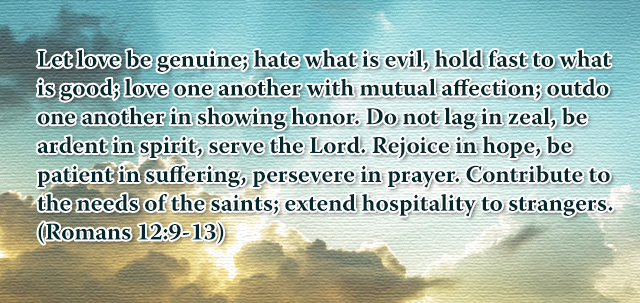Let love be genuine; hate what is evil, hold fast to what is good; love one another with mutual affection; outdo one another in showing honor. Do not lag in zeal, be ardent in spirit, serve the Lord. Rejoice in hope, be patient in suffering, persevere in prayer. Contribute to the needs of the saints; extend hospitality to strangers.
(Romans 12:9-13)
With all the news of restrictions being lifted, restaurants and stores reopening, and people I see gathering in the streets on my evening walks, I can’t help but share some glimmer of optimism for something just around the corner, some way of life that might look like something like the life I was accustomed to before February. It is seductive, and seduction is dangerous, because I recognize that the excitement I feel is about me and my life, not about others. Despite assertions of freedom and the manipulation of data to suit particular agendas, we are not out of the woods, and I worry that we might have become inured to the reality of the world that some face, some very much still face, a reality that is still very much life and death, despite billowing palms in our Florida paradise. I fear we are too eager to play like nothing has happened.
My optimism at seeking a sense of normalcy is tempered by fear that we have forgotten St. Paul’s words from Romans at the top of this page. In our zeal to satisfy our own needs for comfort and convenience, have we sacrificed our Christian care for one another? How is it best to “love one another in mutual affection?” How exactly to we “contribute to the needs of the saints [and] extend hospitality to strangers?”
The answer is verse 12 above, and it is an answer never easy for me to hear. Patience. I am not, by nature, a patient person, and St. Paul’s words are sobering every time I read them. Be patient in suffering and persevere in prayer, he says. The nature of the world is beyond my control, and it is a harsh reminder when I want to fix things, fix a virus, fix economic hardship, fix anxiety, fix illnesses, fix contentious relationships, that the liberating (and admittedly frustrating) reality is that I am not God, and my job—our job—isn’t to fix things that are out of our control; rather, our job as Christians is to care for one another, contributing to the needs of the saints and extending hospitality to strangers, to quote Paul. Our charge from Jesus in the Second Great Commandment, is to love our neighbors as ourselves, and it is my sincerest prayer that as we participate in a world that may not share our values, we take Jesus’ words to heart and always prayerfully consider how we best love our neighbors as ourselves.
Rejoice in hope, sisters and brothers; be patient in suffering and persevere in prayer. And God bless you.
Burl+
Associate for Christian Education, Pastoral Care, and Outreach

